It Starts with One: Celebrating 100 Years of the James T. Laney School of Graduate Studies
Celebrating Around the World
The year 2019 marked 100 years of graduate education at Emory University. The Laney Graduate School (LGS) celebrated this milestone with a series of events in Atlanta and around the world, highlighting the public face of graduate education across the disciplines. Starting in January at the Michael C. Carlos Museum, LGS celebrated the opening of an exhibit by award-winning artist and 2018 alum, Dr. Fahamu Pecou. The centennial celebration concluded, in October, with a lecture by distinguished sociologist of higher education, Dr. Jonathan Cole. The range of centennial events explored the rich diversity of contemporary issues that deep scholarship, fostered by master’s and doctoral education, examines.
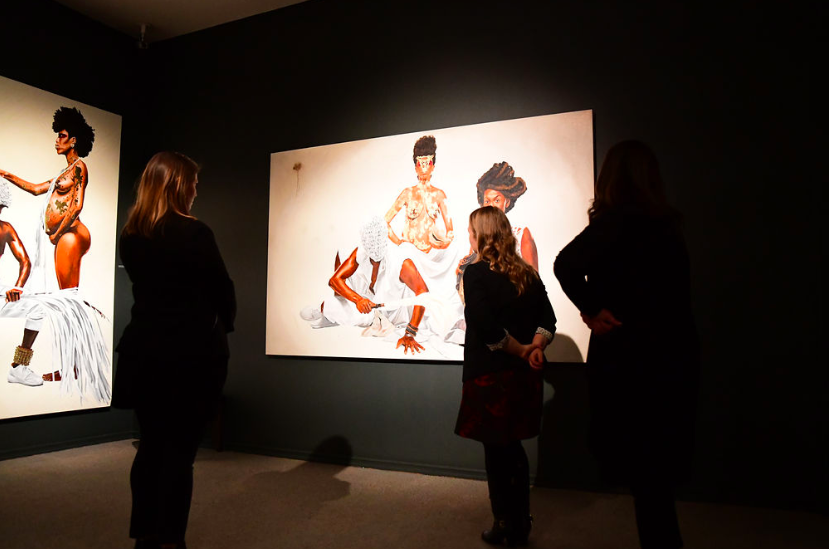
The opening centennial event consisted of an exhibit by award-winning artist and 2018 LGS alum, Dr. Fahamu Pecou at the Michael C. Carlos Museum.
Established in 1919 as a master’s degree-granting unit on Emory’s newly built Atlanta campus, the Graduate School enrolled 36 students in its first year. Today 1,667 PhD students and 125 master’s students comprise the Laney Graduate School’s student body. Since its founding, the school has awarded more than 16,000 degrees in the humanities, natural sciences, and social sciences.
See the video below for a one-on-one interview with Dr. Fahamu Pecou.
Graduate Education Opens Doors
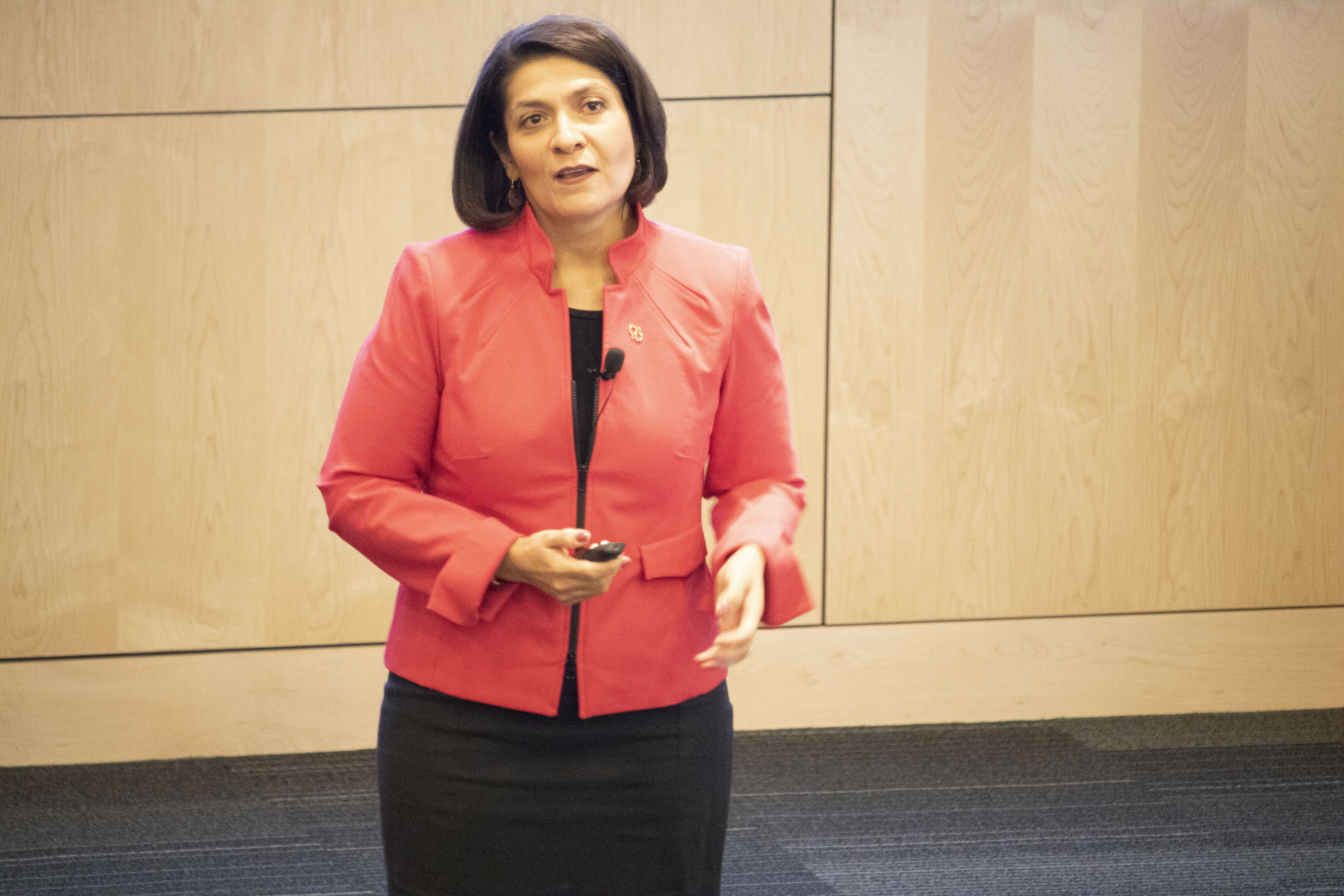
Dr. Maria Carrillo leads the world's largest funder of Alzheimer’s research and works to increase funding for more research on the disease.
The Centennial Lecture Series formed the core of Centennial programming by sponsoring public lectures by five extraordinary public intellectuals whose scholarly pathways illustrate a variety of settings in which individuals trained in master’s and doctoral programs make important contributions to society, science, and public discourse.
Dr. Maria Carillo, Chief Science Officer of the Alzheimer’s Association, kicked off the series with a lecture that emphasized the important role that graduate education and mentorship played in her career. She urged the audience to see graduate learning spaces as “limitless” regarding the range of both personal and professional development. A member of a historically underrepresented group in the biological and biomedical sciences, Dr. Carrillo shared firsthand accounts of how mentorship shaped both her character as an academic and her career trajectory in the neuroscience community. She called on students to be open to opportunities beyond the academy.
“Graduate education opens doors,” she said as she urged students and their faculty to embrace a broad range of professional careers. “There is hope in research; and research takes place in many different settings."
Through A Looking Glass, Darkly
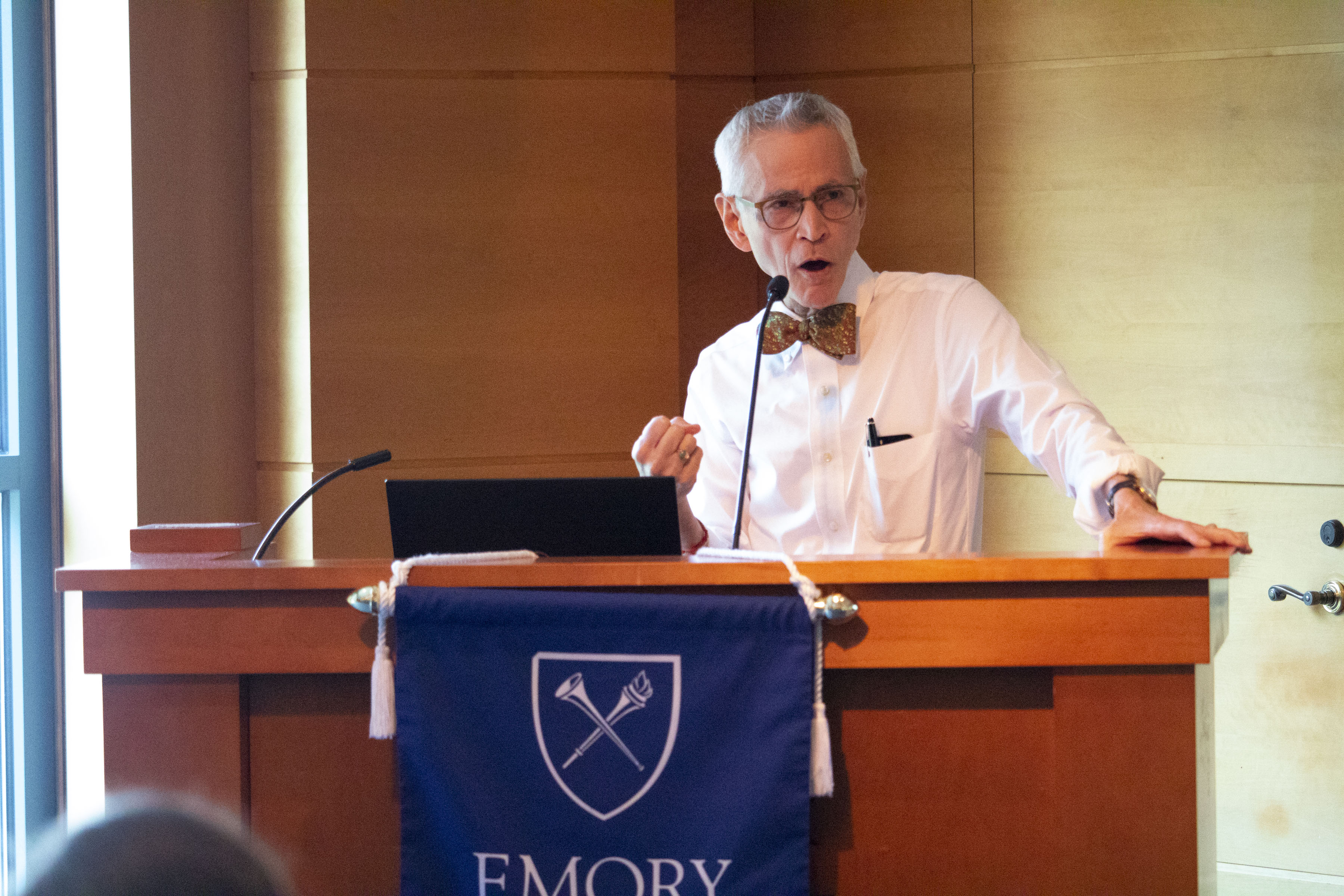
Dr. Walter Melion has written extensively on Dutch and Flemish art and art history of the 16th and 17th centuries, focusing on Jesuit image-theory and the relation between theology and aesthetics in the early modern period.
Dr. Walter Melion, Emory’s own Asa Griggs Candler Professor of Art History and Director of the Fox Center for Humanistic Inquiry, presented the series’ second lecture, which previewed the Carlos Museum’s Works on Paper exhibit, “Through A Looking Glass, Darkly.” The exhibit brought together 90 Netherlandish prints from the 16th and 17th centuries. Each piece highlighted allegorical significance in relation to Christian scripture.
“Allegory permeated…all of Europe in the 16th and 17th century,” said Dr. Melion. “It was everywhere. It filled churches, especially Roman Catholic churches. Allegory is a device with which people engaged with scripture and a device that mediated the religious experience of people not only in the very highest of society but also on the street.”
Professor Melion’s lecture was a scholarly tour de force that demonstrated his extraordinary command of humanities methods—from a meticulous “reading” of a distinct visual artifact, to rich contextualization that situates that artifact within an historical and cultural moment.
After the lecture, the audience had the opportunity to view the prints on exhibit in the Carlos Museum and to discuss them with Dr. Melion.
Even a Moon Shot Needs a Flight Plan

Dr. Alondra Nelson’s work focuses on the intersection of race and social citizenship as well as science’s impact on society.
Dr. Alondra Nelson, president of the Social Science Research Council and Harold F. Linder Chair in the School of Social Science at the Institute for Advanced Study, presented the next lecture entitled, “Even a Moon Shot Needs a Flight Plan: Genetics and Ethics in the Obama Administration.”
The author of acclaimed works that include The Social Life of DNA, Body and Soul: The Black Panther and the Fight Against Medical Discrimination, and, in collaboration with Keith Wailoo and Catherine Lee, Genetics and the Unsettled Past: The Collision of DNA, Race, and History, Nelson explored linkages among science policy, ethics, and political efficiency.
She focused on the Obama administration’s support for precision medicine or treatments tailored to individual patients. This approach has gained widespread support among health providers, but faces deep skepticism among certain segments of the American population. African Americans, in particular, remain wary of the medical establishment due to past abuses and unethical experimentation on vulnerable populations.
Members of the administration recognized that they needed to overcome citizen suspicion and worked to establish and promulgate ethical regulations and to ensure ethical forethought concerning the use of patient information and samples.
Dr. Nelson shared a story that revealed the difficulty of enacting health care policy change. The evening concluded with a reception where audience members continued discussions sparked by her thought-provoking talk.
Dying of Whiteness
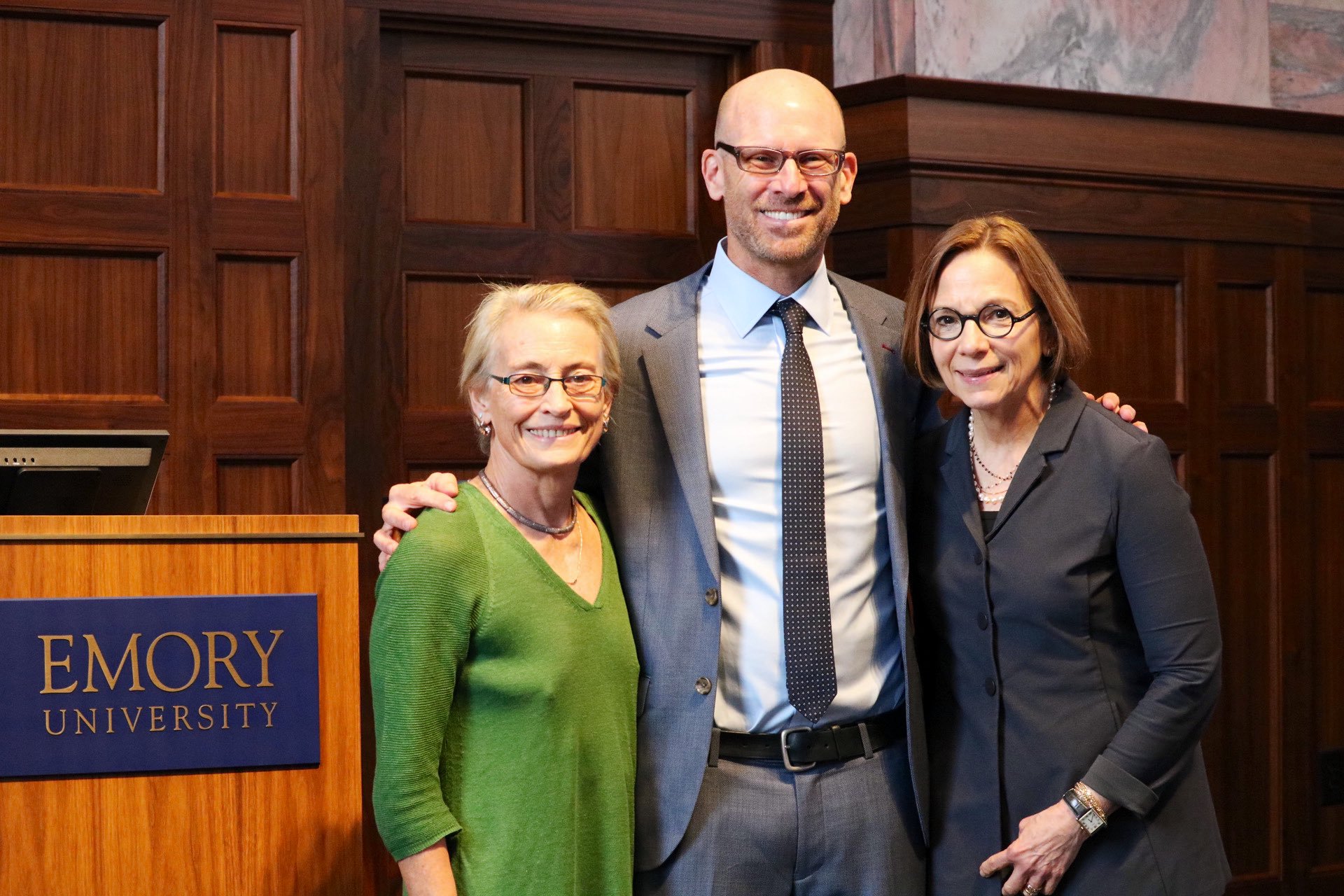
(l-r) Dr. Corrine Kratz, Dr. Jonathan Metzl, and Dr. Lisa Tedesco. Metzl studies gun violence and advocates for the destigmatization of mental illness.
Dr. Jonathan Metzl, the Frederick B. Rentschler II professor of sociology and psychiatry and director of the Center for Medicine, Health, and Society at Vanderbilt University, presented the fourth lecture entitled, “Dying of Whiteness—How the Politics of Racial Resentment is Killing America’s Heartland.” The presentation was based on his recently published book of the same title.
A Missouri native, Metzl was drawn to his subject by a desire to understand why so many lower-income Midwesterners support political policies that seemed to work against their best interests. While his book looks at several policies, including gun access and spending on public schools, his lecture focused on healthcare.
He argues that racial resentment and a sense that members of minority groups or undocumented immigrants would benefit from progressive policies, such as expansion of Medicare, fostered opposition to those policies among white citizens who would also benefit from them. In effect, the politics of racial resentment hurts the population that promotes it.
Freedom and Un-Freedom in American Science

Dr. Jonathan Cole's research covers sociology of science, science policy, and current challenges faced by research universities.
The final Centennial Lecture was delivered by Dr. Jonathan Cole, the John Mitchell Mason University Professor at Columbia University.
Dr. Cole's scholarship focuses on the sociology of science, science policy, and higher education. He has received great acclaim for his influential book titled, The Great American University: Its Rise to Preeminence, Its Indispensable National Role, Why It Must Be Protected. Dr. Cole’s distinguished career as a sociologist is punctuated with numerous accomplishments including his 14-year tenure as provost at Columbia.
“Freedom and Un-Freedom in American Science—The Early Years: 1900 to 1950” focused on the opportunities and options presented to women scientists at American research universities during the first half of the 20th century.
Dr. Cole emphasized how the election of scientists to positions in scientific societies opened up opportunities to some scholars and not others. He compared the careers of geneticists Barbara McClintock and George Beadle to illustrate the disparity between the recognition of scientific contributions made by female and male scientists in the 20th century.
Fittingly, as the final lecture celebrated the first century of graduate education at Emory, Professor Cole’s presentation grew out of a collaborative project between Professor Cole and Daria Franklin, an advanced PhD student at Columbia.
Reflections
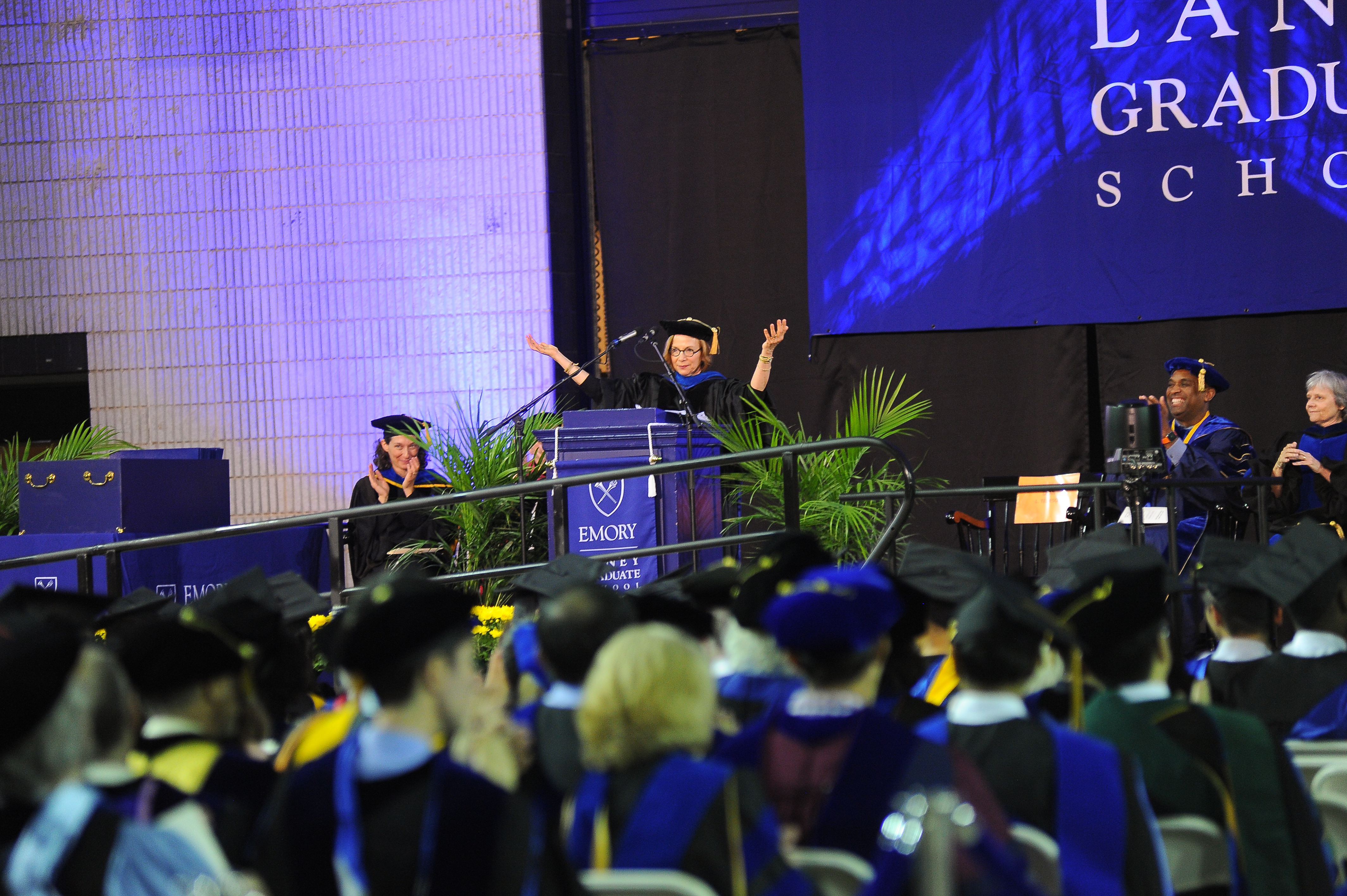
Dean Tedesco takes a moment to congratulate the Laney Graduate School Centennial Class.
As is the case every year, the highlight of the centennial year was Commencement. The class of 2019, now known as the Centennial Class, celebrated both their individual achievements and the enormous achievements of graduate education at Emory over its first century.
Addressing the graduates, their friends and families, and members of the Laney Graduate School faculty and staff, Dean Tedesco emphasized the essential place of graduate education at eminent research universities like Emory. Using the centennial tagline, “It Starts with One,” she encouraged the Centennial Class to explore their paths and "become the one to lead new discoveries, impact the next generation, innovate the mundane, challenge the customary, and change the world.”